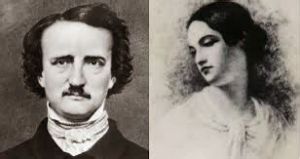Edgar Allan Poe

Edgar Allan Poe (born January 19, 1809 – died October 7, 1849) was an American writer, poet, editor, and literary critic who is best known for his poetry and short stories, considered the inventor of the detective fiction genre as well as a significant contributor to the emerging genre of science fiction. He is widely regarded as a central figure of American literature and Romanticism (or "Dark Romanticism") in the United States. Poe and his writings have seen enormous influence on popular culture, and music, with his January 1845 poem "The Raven"[1] bringing him popularity during his lifetime and remaining one of the most famous poems ever written.
Poe married his 13-year-old cousin, Virginia Clemm, at the age of 27. His letter proposing to Virginia was sent two weeks after her 13th birthday, suggesting that he fell in love even earlier. Poe’s proposal letter is almost desperate with passion for his cousin; he writes[2]:
I cannot express in words the fervent devotion I feel towards my dear little cousin — my own darling.
He asks for her consent and promises to respect it either way:
Ask Virginia. Leave it to her. Let me have, under her own hand, a letter, bidding me good bye — forever — and I may die — my heart will break — but I will say no more.
Poe secretly married Virginia on September 22, 1835. She was 13 at the time, though she is listed on the marriage certificate as being 21. On May 16, 1836, when Virginia was 14, the couple had a second wedding ceremony in Richmond, this time in public. By all accounts, Virginia was equally devoted to her husband. Her only surviving composition is a love poem she wrote for Poe in 1846.
Virginia Clemm's Valentine's Day poem
Virginia's only surviving composition is a love poem she wrote for Poe when she was 23, on Valentine’s Day, February 14, 1846.[3] Note that the first letter of each line spells out his name:
Ever with thee I wish to roam—
Dearest my life is thine.
Give me a cottage for my home
And a rich old cypress vine,
Removed from the world with its sin and care
And the tattling of many tongues.
Love alone shall guide us when we are there—
Love shall heal my weakened lungs;
And Oh, the tranquil hours we’ll spend,
Never wishing that others may see!
Perfect ease we’ll enjoy, without thinking to lend
Ourselves to the world and its glee—
Ever peaceful and blissful we’ll be.
Virginia's death and its impact on Poe
One evening in January 1842, Virginia showed the first signs of consumption, now known as tuberculosis, while singing and playing the piano. Poe described it as breaking a blood vessel in her throat. She only partially recovered, growing worse for five years until she died of the disease in 1847 at the age of 24.
Virginia's death had a significant effect on Poe. He was miserable for several months. A friend said of him, "the loss of his wife was a sad blow to him. He did not seem to care, after she was gone, whether he lived an hour, a day, a week or a year; she was his all."[4] A year after her death, he wrote to a friend that he had experienced the greatest evil a man can suffer when, he said, "a wife, whom I loved as no man ever loved before", had fallen ill.[5]
Poe regularly visited Virginia's grave. As his friend Charles Chauncey Burr wrote, "Many times, after the death of his beloved wife, was he found at the dead hour of a winter night, sitting beside her tomb almost frozen in the snow".[6] Shortly after Virginia's death, Poe courted several other women. Even so, Frances Sargent Osgood, whom Poe attempted to court, believed "that [Virginia] was the only woman whom he ever loved".[7]
Poe died 2 years after Virginia in 1849, aged 40, under mysterious circumstances. The cause of his death remains unknown, and has been variously attributed to many causes including disease, alcoholism, substance abuse, and suicide.
See also
References
- ↑ See text of The Raven - Poetry Foundation; Wiki page about The Raven.
- ↑ Poe - letter to Maria Clemm and Virginia Clemm (1835)
- ↑ A collection of poems between Virginia and Poe
- ↑ Meyers, Jeffrey. Edgar Allan Poe: His Life and Legacy. Cooper Square Press, 1992. p. 207.
- ↑ Sova, Dawn B. Edgar Allan Poe A to Z: The Essential Reference to His Life and Work. New York: Checkmark Books, 2001. p. 53.
- ↑ Phillips, Mary E. Edgar Allan Poe: The Man. Chicago: The John C. Winston Company, 1926. p. 1206.
- ↑ Krutch, Joseph Wood. Edgar Allan Poe: A Study in Genius. New York: Alfred A. Knopf, 1926. p. 57.